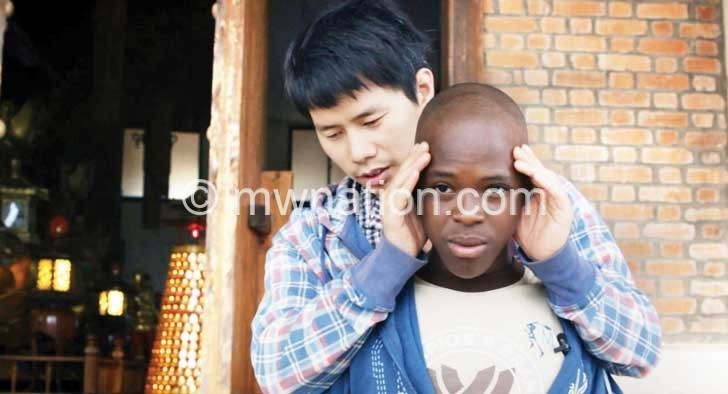Made from Malawi:‘Buddha in Africa’
It is not so long ago that Malawi made it into the global movie narrative with the release of The Boy Who Harnessed the Wind. Now, another film, Buddha in Africa, is rocking the international scene.
The movie in Mandarin and Chichewa with English subtitles had the world premiere at the Hot Docs Canadian International Festival in April. This month, it was screened at the Sydney Film Festival in Australia and it returns to Africa at the Durban International Film Festival.

The 90-minue film, by first time South African filmmaker Nicole Schafer, was premiered in her home country last week at the Encounters International Documentary Festival.
Before its release, the film bagged the top award at the Cape Town International Film Festival and Works-in-Progress lab.
Buddha in Africa brings out the plight of an orphan with dreams of becoming a Malawian version of Jet Li enlists into a local home. Enock Alu was living with his grandmother when his mother died and his father deserted him to remarry.
Basically, it is a deep into the Amitofo Care Centre (ACC), a Buddhist orphanage which opened its doors in Malawi in 2003, where Enock was raised.
A synopsis from Momento Film, the Swedish production company which co-produced the documentary with the South African company Thinking Strings Media, the film follows Enock’s life, exposing the contrasting worlds of his traditional African culture and the strict discipline of the Confucian, Buddhist value system of the Chinese.
“Once the star performer with dreams of becoming a martial arts hero like Jet Li, Enock, in his final year at school, has to make some tough decisions about his future and finds himself torn between returning to his relatives in the village or going abroad to study in China,” the company website says.
This, it continues, is against the backdrop of China’s global rise and influence in Africa, the film is a subtle exploration of the forces of cultural soft power on the identity and imagination of an African boy and his school friends growing up between two cultures.
The movie trailer, which we have seen, prospects a film that will shake the grounds, not only in Malawi, but also on the global scene as Sino-influence on culture, politics and economics continues to grow.
Schafer came to know of ACC on an assignment for Reuters’ magazine programme Africa Journal.
“I was working on a story on orphans in Malawi at a time Madonna was adopting her second child, Mercy, in 2009. I was actually surprised during that period of research that there were a number of orphanages promoting different cultural practices, from Dutch Reformed Church institutions to Islamic Turkish ones. Madonna subsequently set up her own Kabbalist institution,” says Schafer.
She chanced on Enock the first time she was doing a small feature video and she needed an orphan at ACC who was fluent in Mandarin and Kung Fu. It took years for Enock to come out of his cocoon and open up to the real struggles.
“Enock’s dilemma represents the greater dilemma around the future development of Africa. It’s not only about China and Africa, it is also about Africa’s relations with other foreign countries, including the former colonisers,” she said.
According to Enock’s kung fu coach Xiao Bei said of him: “He was lovely and also also the youngest in the group, so he was very eye-catching. When it was Alu’s turn to go on stage, people kept calling his name Alu! Alu!”
It is no wonder that Enock was among children used on ACC’s fund-raising trips that saw him in Taiwan, Hong Kong, China, Singapore, Malaysia, Thailand, Japan, Cambodia, New Zealand, Australia, USA and South America.
Already, the film is getting reviews. One of South Africa’s leading publications, The City Press, reported that the movie shows children waking up at the crack of dawn for rigorous temple sessions, attending gruelling Kung Fu lessons and they are even given new Chinese names, forced to worship other gods.
The school principal Master Hui Liu says in the film: “Now that you are part of ACC, you must follow the Buddhist commandment, and follow our ways. Because only in this way will donors continue to support us.
“You may decide you don’t like this way, and don’t want the opportunity to study abroad later. You don’t want to learn the civilisation and the advanced thoughts of the world. You prefer to go back to your tribes.”
Reacting to the news, social commentator William Mandisa seems stunned that, in this day and age, children have no say but keep living in such conditions, a thing which infringes their basic human rights.
“This story tells volumes on how organisations have ignored their human obligation of taking care for vunerable,” he noted.
He, however, said although the centre has done some commendable work lately, there is a need to step up the efforts to improve the welfare of the destitute children, partly by being proactive and inclusive in seeking solutions.
Consequently, he remained uncomfortable with some scenes in the film where according to the publication images of starving African children are in the background.
But, a Mapanga resident Kennedy Kambani—Banda, 39, wonders why alienating the kids from their own culture, language and culinary needs in their own country.
“I would understand if the orphanage was in China… But this is Malawi where the children will spend the rest of their lives with a langauge, culture and even culinary tastes that are alien to the communities they were born in,” he said.
Depending on how you read it, this documentary is either an urgent look at China’s soft domination of African nations through its children. Or it’s the picture of a Chinese school trying to make a difference–but often getting it wrong–in a country where the cultural differences are vast.





